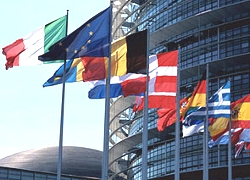New sanctions can hit Russia’s nuclear sector
8- 15.01.2015, 16:06
- 45,983

On January 15 the European Parliament has adopted a resolution on Ukraine.
The resolution describes the new sanctions Russia can face in case it would not abide by the conditions of the EU, RBK writes.
The document notes that “in case of any further actions of Russia aimed at destabilizing of Ukraine,” the European Council should adopt new restrictive measures and widen their scope, “encompassing the nuclear sector and limiting the opportunities of Russian organisations to carry out international financial transactions.
The resolution also tells about the necessity to extend the existing sanctions, in case Russia would not fulfil Minsk agreements. MPs decided to oblige the European Commission increase effectiveness of interaction between the EU members in case the crisis in relations with Russia continues.
The deputies have noted that it is necessary to work out a clear set of demands, on fulfilling if which imposing of the new sanctions against Russia would depend, or lifting of the existing ones. In particular, the matter concerns observing the truce, unconditional removing of all Russian troops or illegal military formations supported by Russia, from Ukraine; exchange of all captives, including officer Nadezhda Savchenko, and regaining control over its entire territory, including Crimea, by Ukraine.
The sanctions against Russia were imposed by the EU and the US in 2014 after Russia annexed Crimea and launched a conflict in south eastern Ukraine. In addition to personal sanctions against some Russian officials and politicians, the EU and the US limited access to foreign capital markets for several major Russian banks and state companies. Besides, a ban was imposed on giving Russian companies technologies on deep-sea extraction of oil and Arctic Shelf Development. In response, in August 2014 Russia banned imports of certain food products from some Western countries.
According estimation of experts of the Institute of Strategic Analysis of FBK Grant Thornton, in 2014 the GDP of Russia dropped because of the sanctions by 0.2%, or 121.4 bn rubles. In case the sanctions will be in force for a year, the decrease of the GDP will be 1.2%, or 949.4 bn rubles.
The effect of the sanctions is enhanced by dropping of the Russian ruble’s exchange rate and speeding up of the inflation, caused by the abrupt decrease of oil prices. According to analysts of the Polish institute of International Affairs, sanctions against Russia could be compared to exposure to radiation: “the longer Russia is under their influence, the stronger the effect will be.”










